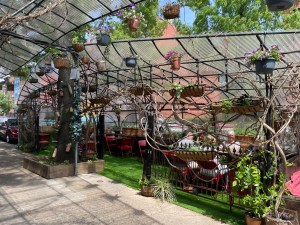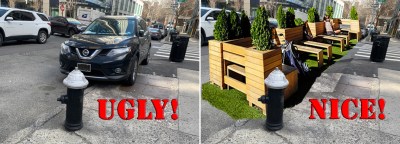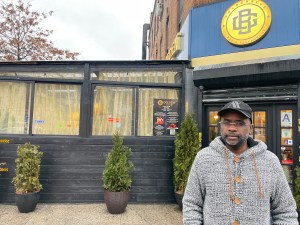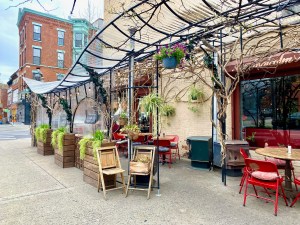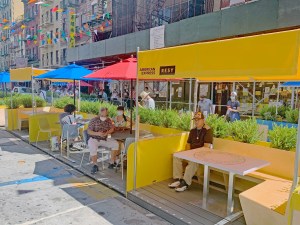First Salvos Fired as de Blasio’s ‘Permanent’ Dining Sheds Begin the Community Board Process
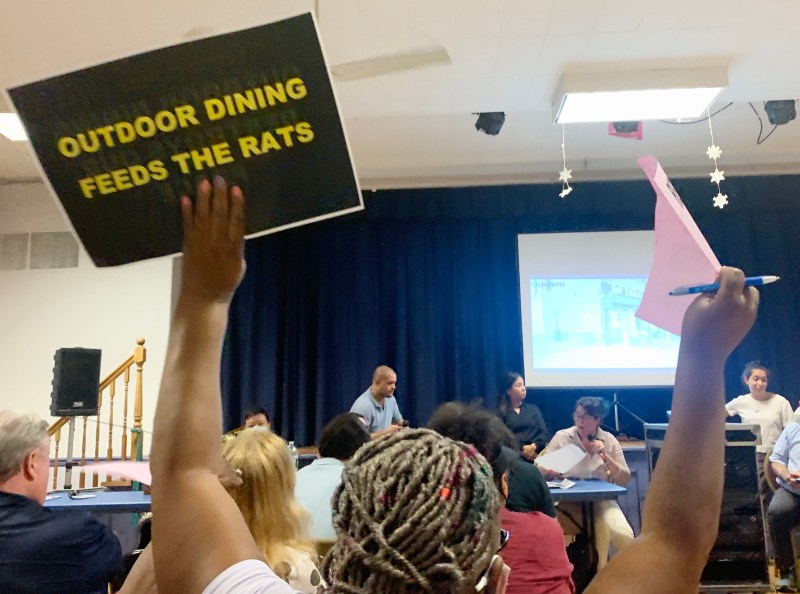
The community boards are poised to take a bite out of Mayor de Blasio’s COVID streeteries.
The city’s outdoor dining program, which the mayor says is permanent, kicked off months of community board hearings on how to actually regulate it on Tuesday night in a raucous meeting in the very epicenter of the city’s boisterous (some say oversaturated) restaurant scene — the Lower East Side.
City officials were on hand at Community Board 3 to discuss how they will transform outdoor dining from its current slightly chaotic, pandemic-era emergency measure into a regular part of New York street life, including tweaking current zoning law that prohibited sidewalk dining so that eateries and pubs can provide the outdoor tables. Every community board in the city will get a similar presentation, but Community Board 3 — which covers bar-heavy Lower East Side, East Village and part of Chinatown — was prime for a showdown, thanks to small pockets of opponents who have been trying to rally support in recent weeks.
It wasn’t the arcane zoning rule that drew a packed room of aggrieved downtown residents to testify that living above or next to outdoor dining structures has made their lives a hellacious, vomit-strewn, frat-and-rat party.
“These sheds are rat traps,” Alexis Adler, who said she’s lived on 12th Street for 40 years, told the board while holding a picture of a dead rat. “We are sweating through a pandemic, we are inviting the next pandemic with these sheds.”

There was plenty of talk of compromise and coexistence from the crowd of 90, but many attendees went nuclear, demanding no outdoor dining at all, denouncing struggling restaurants and bars as greedy land-grabbers, and, in one case, waving signs inspired by George Orwell’s classic Dystopian novel: “1984: War is Peace. 2021: Residential is commercial.”
One opponent was overheard outside the meeting comparing their struggle to that of Martin Luther King Jr. One speaker declared — to a room where more than half the people were still wearing masks — that the pandemic was over, and therefore outdoor dining should be, too.
None of the opponents mentioned the road-hogging elephant in the room: outdoor dining takes away free on-street parking spaces. In fact, some opponents of outdoor dining as it is currently configured have said they do not mind the lost parking, and have actually asked why public space is being given over to one industry when it could be put to other uses.
A few people spoke in favor of the city’s desire to codify the emergency restaurant initiative, saying that the chaotic scene in such noxiously bridge-and-tunnel places as the Lower East Side’s Hell Square shouldn’t ruin it for the whole city.
“Finally having rules and regulations around it will clarify what is OK and what is not OK is going to improve the situation,” said Brian Oxman, who lives on St. Marks Place.
Those rules, in theory, would address most complainers’ concerns; the Department of Transportation says it would set strict rules about outdoor operating hours and noise, and require wider pedestrian clearance for sidewalks. Restaurants will eventually have to pay a fee, and the city is funding a “robust enforcement unit,” DOT Deputy Borough Commissioner Jennifer Sta. Ines said.
And the kind of outdoor-but-still-indoor buildings we all joked about during the pandemic would be no more, as would some of the more artsy pergolas, flower-lined canopies and recreated train cars that brought joy to many during the dark months: the structures would have to be moveable, and might have to close for the winter to allow for snow removal.
“We’ve heard it from both sides,” Sta. Ines said. “Restaurants, some of them have felt squeezed and have complained of over-inspections. Also neighborhoods and communities, particularly the mobility community, were concerned about enforcement. Going forward, this is something that will be addressed.”
But all that won’t happen until the permanent program is finalized in 2022, which means the status quo will stay in place until then. At the thought of that, the crowd erupted into boos louder than outdoor drinkers when Off the Wagon announces last call.
“If the DOT hasn’t managed to fix a broken manhole cover in two years, I don’t know how they’re going to manage all these restaurants,” one Sixth Street resident said.
For all the yelling, no action was actually taken: the Community Boards will continue to review the proposal through late September; after this zoning issue, there are still two more steps before the program would be locked and loaded. At least one restaurant owner hopes things can become peaceful before that.
“My mind really got changed a lot tonight,” said Ashwin Deshmukh, an owner of Williamsburg Pizza. “And it feels like the restaurants really have to talk to our neighbors a lot more.”
